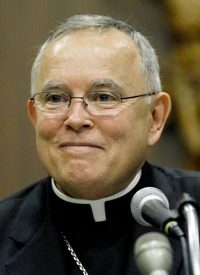
According to a report from the Media Research Center’s CNSNews, the new archbishop of Philadelphia raised the topic during a recent address to 10,000 pilgrims in Spain. And, according to CNSNews, Archbishop Charles Chaput did not hesitate to “name names” when it comes to identifying religious bigotry in the media:
Chaput told the audience that, “In the United States, our battles over abortion, family life, same-sex ‘marriage,’ and other sensitive issues have led to ferocious public smears and legal threats not only against Catholics, but also against Mormons, evangelicals, and other religious believers.”
“And with relatively few exceptions,” he said, “the mass media tend to cover these disputed issues with a combination of ignorance, laziness, and bias against traditional Christian belief.” The Archbishop continued: “We make a very serious mistake if we rely on media like the New York Times, Newsweek, CNN, or MSNBC for reliable news about religion. These news media simply don’t provide trustworthy information about religious faith — and sometimes they can’t provide it, either because of limited resources or because of their own editorial prejudices.”
“These are secular operations focused on making a profit,” he said. “They have very little sympathy for the Catholic faith, and quite a lot of aggressive skepticism toward any religious community that claims to preach and teach God’s truth.”
Chaput’s words certainly resonate with almost any believer who has watched the degeneration of media coverage of issues where religious convictions intersect with the agenda of the political and religious Left. When combined with the portrayal of religious conservatives in other television programming, the result is an onslaught against believers. The fictional portrayals would be far less dangerous if not being presented in the context of news media which systematically misrepresent the beliefs of traditional believers; although, as Chaput noted, there may be a variety of motivations for such misrepresentations, the effect has been “ferocious public smears and legal threats.”
Given what the media could only perceive as the temerity of the archbishop’s remarks, it is little surprise that pretentious media mavens would pounce on Chaput, seeking to either pummel him into silence, or at least to delegitimize his views. Consider, for example, the blog of Erik Wemple at WashingtonPost.com. Wemple’s first word reacting to Chaput’s criticisms is to call the archbishop a “hard-liner” — a term which is apparently equally useful for describing theologians, Stalinists, and supporters of Saddam Hussein — and presumably a code word for “people who should never be listened to.”
But Wemple goes further: “News organizations should have little sympathy for any entity as powerful as the Catholic Church.” Of course, the archbishop’s claim was that “a lot of aggressive skepticism toward any religious community that claims to preach and teach God’s truth” — which certainly applies to many religious bodies which lack a thousandth the worldly “power” of the Roman Catholic Church. Does Wemple believe small communities of believers should be subjected to the same rough treatment, or is his invocation of the power of the Roman Catholic Church simply a diversion from the actual issue at hand: The archbishop’s claim that the media institutions that he identified are inclined to turn their aggressive skepticism against any institution opposing their left-wing agenda?
Aside from a few writers such as Wemple, it is likely the media will simply elect to ignore Chaput’s criticisms — until such time as there is an occasion for payback. The rote denials of media bias that are often undertaken by its most brazen perpetrators are of little interest, and there is little reason to anticipate that the so-called “major media” will change their political agenda. Criticisms offered by conservatives will have little impact on the media institutions, and simply highlight the fact that the only "solution" is for citizens to show discernment when it comes to listening to the news, and selecting their sources for information. What is worth noting is that Chaput’s "crime” in the eyes of his critics is to acknowledge the very fact that they are prepared to praise as a virtue: The news companies are secular, driven by profit, and often staffed by those who have a profound skepticism of anyone who would take his religious faith seriously. Chaput, it would seem, is a “hardliner” for saying what everyone knows to be true.
Photo of Charles Chaput: AP Images



